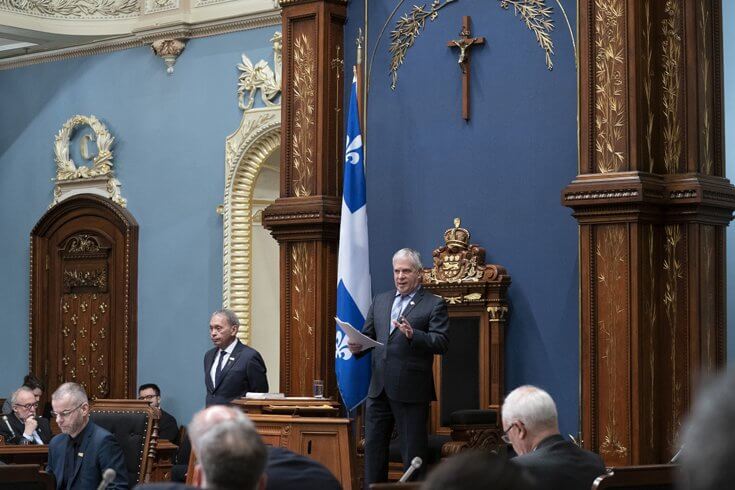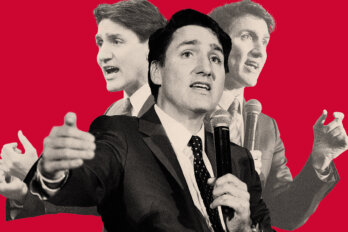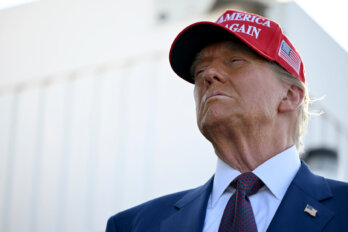Even before Bill 21, formally known as An Act Respecting the Laicity of the State, was introduced in Quebec’s National Assembly, it was already making headlines. The bill—which calls for teachers, police officers, and judges to be free of all religious symbols when on the job, and for those who provide or require formal identification to receive provincial-government services to do so with their faces uncovered—is not Quebec’s first attempt at legislating discrimination against religious minorities. For well over a decade now, the province has been embroiled in a seemingly never-ending discussion about religious-minority rights.
Laïcité—the concept that underwrites this ongoing debate—is a specifically French tradition of secularism based on a strict separation of government and religion. Although people often use the words secularism and laïcité interchangeably, the English version of Bill 21 uses “laicity” instead; the English word—which derives from “laic,” an archaic term for someone who is not a cleric—is not an exact or accurate translation. Laïcité implies and demands commitment to an inherited understanding of French identity above all things.
Quebec’s current debate about the role of religion in public life goes back to controversies, in 2006 and 2007, over what counts as reasonable accommodation for members of religious minorities. First, the Supreme Court of Canada overruled the Quebec Court of Appeal in the Multani case by affirming that a Sikh kirpan, or ceremonial dagger, could be worn in the classroom (provided it be underneath one’s clothing and sewn into a sheath) after a school board had forbidden a Sikh student from doing so. Then, the public conversation shifted from questions of fundamental religious rights to ostensibly more mundane issues, like optional pork-free menu items at a cabane à sucre and frosting gym windows to accommodate a Hasidic synagogue and yeshiva. The idea that Quebec was losing its secular identity because of religious minorities and immigrants—the discourse often conflated the two—became regular fodder for the province’s tabloid papers and talk radio.
It wasn’t long before political actors started to capitalize on the public’s growing perception that religious minorities were taking advantage of Quebec’s hospitality. The tiny town of Hérouxville enacted a code of conduct which, in addition to explaining the importance of Christmas decorations, banned its nonexistent immigrant population from conducting public stonings. Mario Dumont, then leader of the now defunct l’Action démocratique du Québec (ADQ) and current cable-news personality, made Hérouxville into a rallying cry, calling for a province-wide defence of “Quebec values” (such as equality between men and women) and arguing that municipalities like Hérouxville were simply filling a necessary void in provincial legislation.
With a provincial election looming, Quebec’s then Liberal government decided it could no longer afford to do nothing: public sentiment on the issue of reasonable accommodation had reached a tipping point and had an articulate champion in Dumont. Premier Jean Charest announced the Consultation Commission on Accommodation Practices Related to Cultural Differences, known more widely as the Bouchard-Taylor Commission. In their final report, the commissioners noted that much of the frenzy over the reasonable-accommodation debate was a “crisis of perception,” finding that “media enthusiasm” and rumours had contributed to it. The authors also found that Quebecers’ own issues of identity were at play, writing that “the so-called wave of accommodation clearly touched a number of emotional chords among French-Canadian Quebecers in such a way that requests for religious adjustments have spawned fears about the most valuable heritage of the Quiet Revolution, in particular gender equality and secularism.”
A couple of years later, in 2010, the Charest Liberal government tried to implement a ban on women wearing the niqab while receiving government services or performing jobs in the public sector. After a woman wearing the niqab was twice expelled from a government-sponsored French course, the debate over reasonable accommodation once again moved to the forefront of political and media discourse. Garnering national attention, then prime minister Stephen Harper and then Liberal leader Michael Ignatieff both supported the proposed ban. The legislation didn’t pass, but the sentiment that the province was being overly accommodating to religious minorities never died out amongst many Quebecers.
Then, in 2013, the Parti Québécois (PQ) decided to one-up the Liberals’ niqab ban by introducing the Charter of Quebec Values: a bill that sought to ban all “ostentatious” religious symbols (which would include everything from Sikh turbans and Jewish kippahs to overly large crosses worn over one’s clothing) for anyone on the provincial payroll. The charter was never passed—the PQ ultimately lost the election the following year—but the subsequent Liberal government passed its own law, Bill 62, with a revised scope. Like previous Liberal efforts, it once again targeted face coverings; unlike the proposed PQ charter, it expanded application to those receiving government services—thus, famously, it barred women in niqabs from riding the bus. It was less than a year before a Quebec court blocked parts of it.
Which brings us to present-day Quebec enacting Bill 21 and barring those in “positions of authority”—such as teachers and police officers—from wearing religious symbols while on the job.
The problem with all this, of course, is that freedom of religion is a fundamental tenet in this country, protected by section 2 (a) of the Canadian Charter of Rights and Freedoms. Quebec law, by limiting this freedom, flies in the face of a basic right all Canadians are entitled to.
Importantly, Quebec is also inconsistent in its adherence to secularism. One element that distinguishes laïcité from secularism more broadly is that the former is rooted in French history—a history inextricably intertwined with the Catholic Church. This history is evident in public spaces all over the province, which are peppered with Christian symbols, like the giant cross atop Mont-Royal in Montreal. Bill 21 even recognizes this in its explanatory notes, stating that “the bill may not be interpreted as affecting the emblematic or toponymic elements of Québec’s cultural heritage that testify to its history.” It also happens that the practice of Christianity is in no way impeded by this bill, while that of other religions is: Bill 21 has the practical effect of targeting only minority faiths, such as Judaism, Sikhism, and Islam, in which adherents are required to wear certain garb or symbols. This isn’t a question of simply removing religious symbols—it interferes in the actual practice of religion.
Bill 21’s supporters argue that nobody is barring individuals from practising their religions at home and that, in some cases, wearing religious symbols is not an explicit religious requirement. This line of reasoning has no legal weight, however. The Supreme Court of Canada has, in a ruling clarifying what constitutes freedom of religion, been explicit on the matter: in order to qualify for legal protection, all that is required is that a religious belief be sincere in nature; whether that religious belief is grounded in any objective religious obligation is immaterial.
Premier François Legault and the governing Coalition Avenir Québec know this. They’ve learned from the mistakes of their predecessors and protected Bill 21 by preemptively invoking the notwithstanding clause—the constitution’s override clause, which allows a government to temporarily set aside certain Charter rights—to make any legal challenges to the bill much more difficult.
The public is largely onside. Bill 21 is wildly popular in Quebec and polls very well in the rest of the country too. According to a poll conducted by Léger Marketing in April, 66 percent of Quebecers are in favour of banning religious symbols worn by those in positions of authority. In English Canada, support for the bill hovers around 40 percent in Ontario, British Columbia, Saskatchewan, and Manitoba. (It is least popular in Alberta, where it has 34 percent approval.)
Those who conflate brute-force majority with democracy say that Bill 21 is inherently defensible because of its popularity—a justification often made by Legault himself. He told reporters, at the outset of the federal election, that he wanted all party leaders to stay clear of the issue, saying, “We can see the vast majority of Quebecers are for Bill 21, so I think it’s not a matter for the federal government.” Except that modern democracies—including Canada—have legislation in place to protect minorities precisely in situations like this.
Defenders of Bill 21 and of Quebec’s repeated forays into selective secularism are correct to point out that the province has a unique, fraught past when it comes to the state and religion. The Quiet Revolution firmly entrenched the concepts of gender equality and secularism in Quebec society. Because of this history, and unlike the rest of Canada, Quebec does not quite aspire to multiculturalism but rather prefers the concept of interculturalism, which can be loosely defined as a policy that emphasizes the integration of cultural and linguistic minorities through engagement. In this regard, Quebec tends to find itself much more akin to parts of Europe, such as France, than to the rest of Canada.
But this, too, cannot fully justify Bill 21. Laïcité has been cited as an inspiration each time Quebec has attempted to curtail the rights of religious minorities. The problem with this, however, is that France is an explicitly secular republic. Canada is not. The very first sentence of the first article in France’s constitution states: “France shall be an indivisible, secular, democratic, and social republic.” The Canadian constitution has no such article. Quebecers may prefer, because of their historical connections with France, to implement similar secularist policies, but they do not have the same legal foundation contemporary French lawmakers have for doing so.
Yet perhaps the most puzzling part of Quebec’s doggedness on the issue of state neutrality is the fact that the state is already neutral. State neutrality means that all people are treated equally and that the state has no preference for one set of religious customs, beliefs, or practices over another. The Supreme Court of Canada has made and upheld this point several times, and there is no reason to believe the principle is under threat.
A society simply cannot achieve equality under the law if that law is in any way dependent on or influenced by traditional texts that actively deprive women, children, sexual minorities, and marginalized communities of the basic rights they are entitled to. But this is separate, and separable, from ensuring individual freedom to protect individual conduct. A society is also not egalitarian if religious minorities are deprived of employment opportunities at the behest of the state operating under the guise of neutrality.
All of which brings us to the current federal election. You would think, after all, that a province enacting legislation that substantially limits the rights of some of its citizens would be a matter of significant interest on the campaign trail. You would, in the case of Canada in 2019, be mistaken. Neither the press nor political leaders have come anywhere close to addressing this state of affairs with the seriousness it deserves.
By all rights, at some point in the course of this election, we should have seen passionate defences of minority rights and leaders extolling the values of pluralism in a multicultural society. We should have at least attempted to have a real discussion of the challenges Quebec’s decision poses to values the rest of the county is supposed to hold dear. But Quebec has seventy-eight federal seats up for grabs, and it is extremely difficult to form government without winning a fair number of them. The electoral calculus is obvious.
There are three main legal options available to the federal government should it wish to intervene in this situation. The most potent of these is the constitutional power of disallowance, which is based on section 56 of the Constitution Act and which the government could use to invalidate the law in its entirety. Essentially, the federal government has the constitutional authority to “disallow” any provincial legislation, within two years of its adoption, should that legislation encroach on federal jurisdiction or conflict with national interest. This is also the least likely alternative: disallowance was last used in the 1940s and would likely send the entire federation into disarray, as it would be seen as a major crisis in federal-provincial relations.
A more likely approach would be for the federal government to join one of the two current legal challenges underway. One of these challenges has been made on the basis that Bill 21 disproportionately impacts Muslim women, thereby triggering section 28 of the Charter of Rights and Freedoms, which guarantees gender equality and is not subject to the notwithstanding clause. The other challenge seeks primarily to invalidate the bill on the basis that legislation impacting religious freedom tends to fall under the umbrella of criminal law, which is federal jurisdiction. And a third option the federal government could pursue would be to refer the question of the bill’s constitutionality to the Supreme Court.
Andrew Scheer has been the clearest of the three main party leaders, stating plainly that a Conservative government would in no way legally challenge Bill 21. Scheer’s refusal to uphold religious freedom in Quebec is perhaps the most perplexing out of all the leaders’ responses, as he is quite open about being a person of faith and has committed to reopening the Harper-era office of religious freedom. More cynically, the Conservative Party is the only one that has an actual path to victory without being wholly dependent on a robust contingent of Quebec seats. (When the Conservatives won a majority government in 2011, under Harper, they did so with only five seats in Quebec.)
After repeatedly saying that an NDP government would not intervene, even going so far as to call it interference, Jagmeet Singh said after the English election debate that, if one of the existing legal challenges went up to the Supreme Court of Canada, he would review it. Singh didn’t really clarify what he meant by “review” and, during the second French debate, seemed to distance himself from even that position, simply reiterating that he would not intervene and emphasizing again that he would not “interfere.” His inability to commit to a clear stance on the issue—a bare-minimum standard—is disheartening. Whether fair or not, as an amritdhari or baptized Sikh, Singh was always going to be presented with challenges in Quebec that no other current leader would face. Given how long this debate has been percolating, it is rather odd that the NDP was not better prepared for this fight, especially since Singh himself is quite outspoken on issues of human and minority rights.
Justin Trudeau’s stance sets him apart from the other leaders in that he has consistently refused to close the door on potential legal intervention. It is not patently unreasonable for a federal leader to want to wait and see how the courts will respond to the bill’s current legal challenges before referring the issue of its constitutionality to the Supreme Court or opening up their own challenge. Trudeau should be clear on what a future Liberal government would be prepared to undertake, however, instead of simply coasting on the other leaders’ outright cowardice and equivocation on the issue.
In 1807, the people of Trois-Rivières, Quebec, elected Ezekiel Hart—an observant Jew who kept his head covered—to the legislative assembly of Lower Canada; they reelected him once more. This made Quebec one of the first jurisdictions in the British Empire to elect a Jewish representative to its legislature. Quebec was also the first place in the British Empire to grant Jews equal rights, enacting the Act to Grant Equal Rights and Privileges to Persons of the Jewish Religion in 1832. Quebec was once a world leader in promoting tolerance and equality of minority religions. That, too, is an aspect of Quebec’s patrimoine, one which all Quebecers should be extraordinarily proud of.
October 23, 2019: An earlier version of this article stated that there is a crucifix on Mont-Royal. In fact, it is a cross. The Walrus regrets the error.






